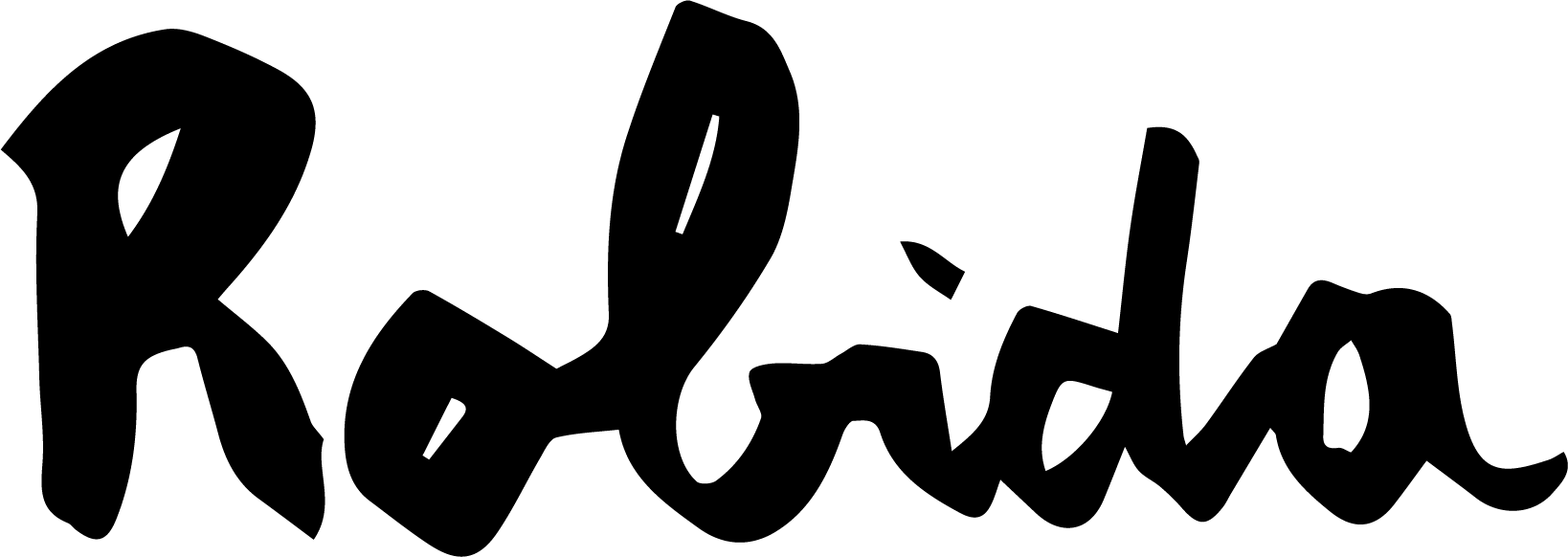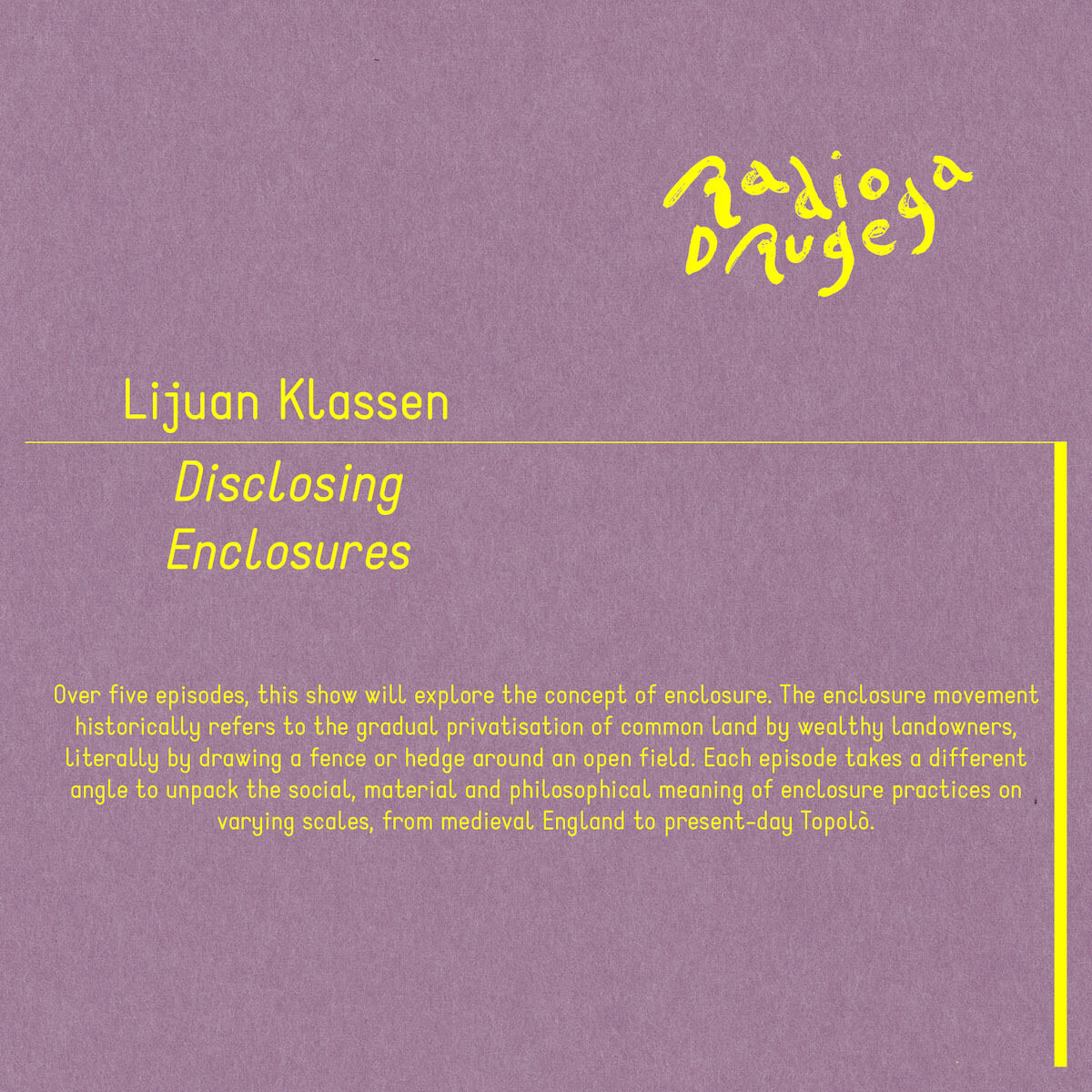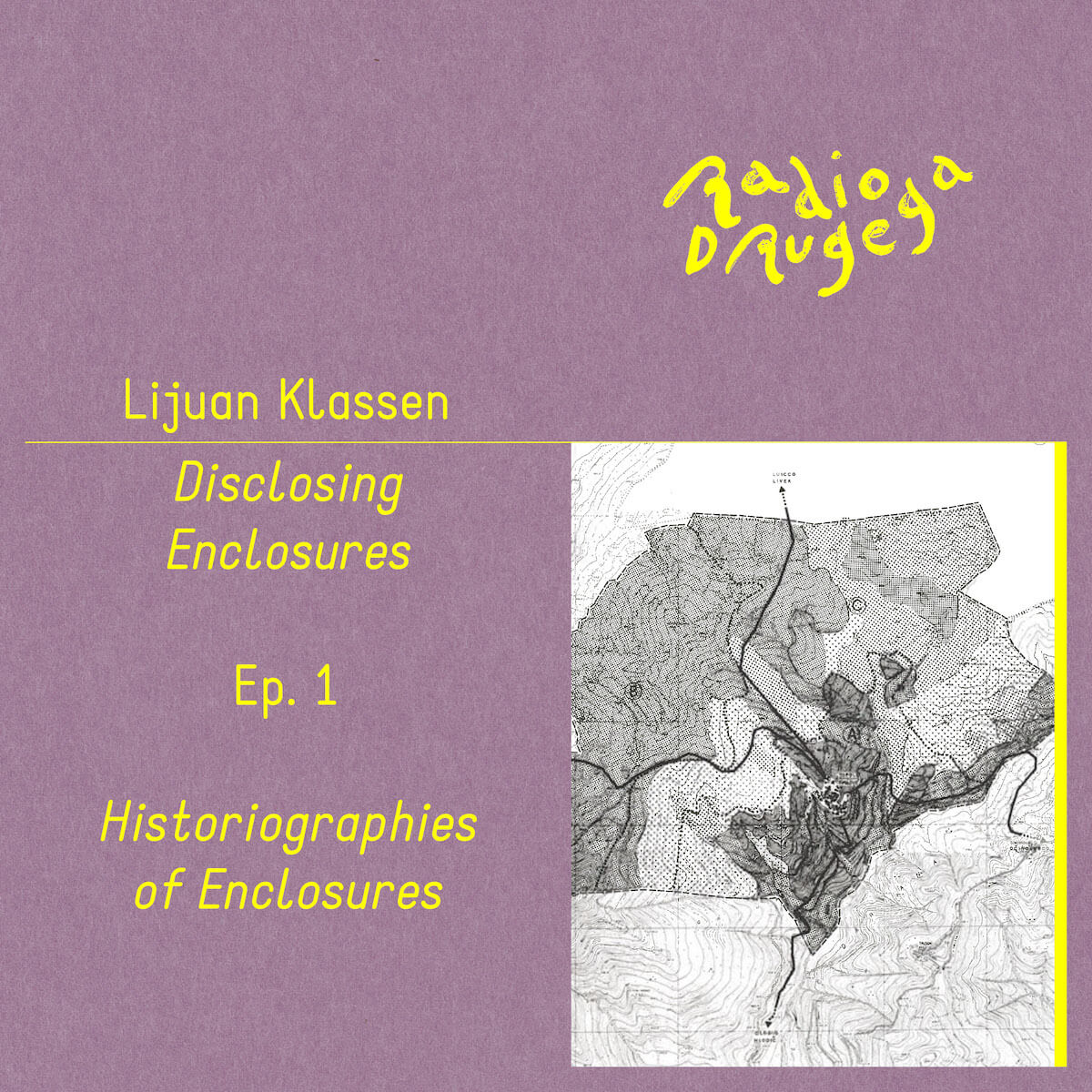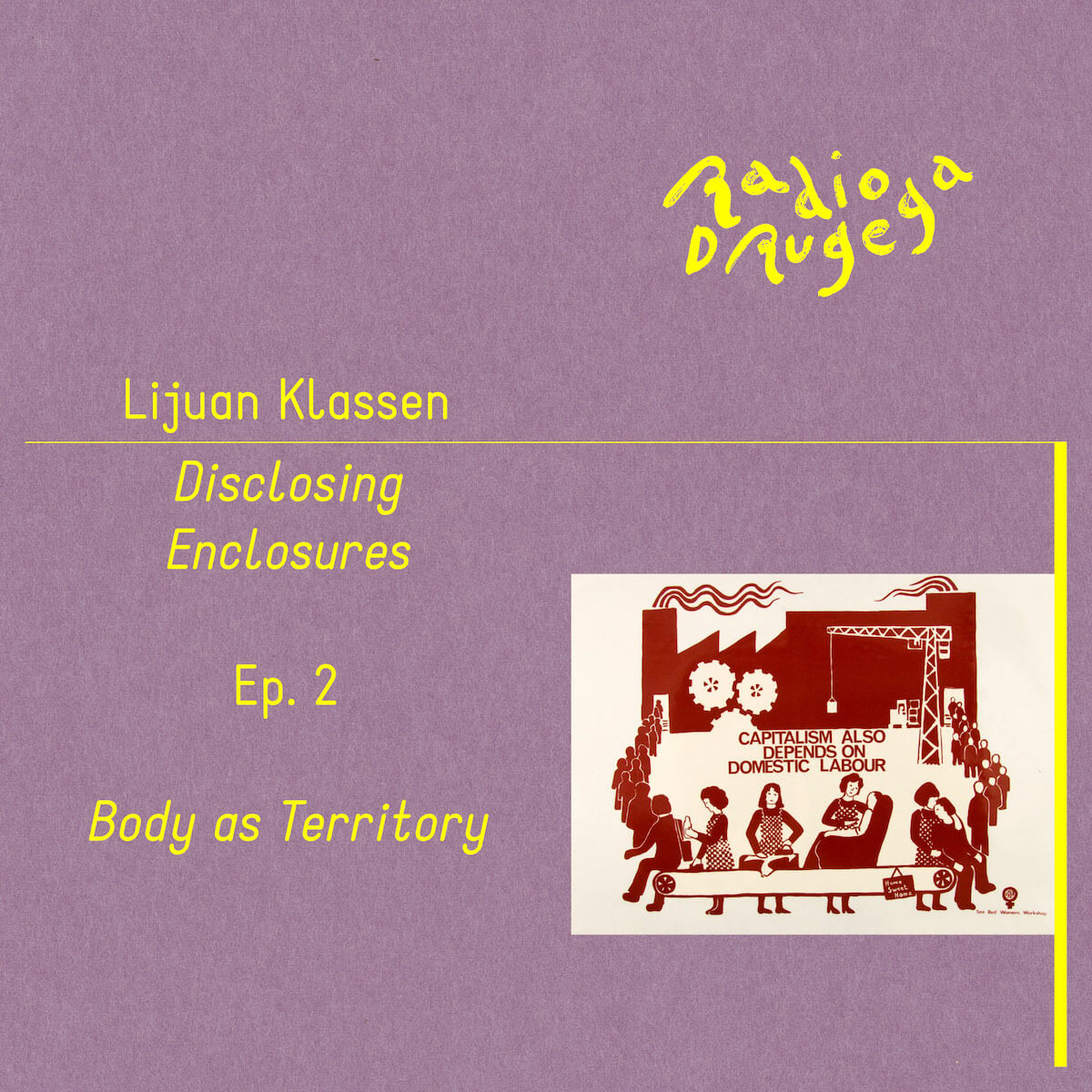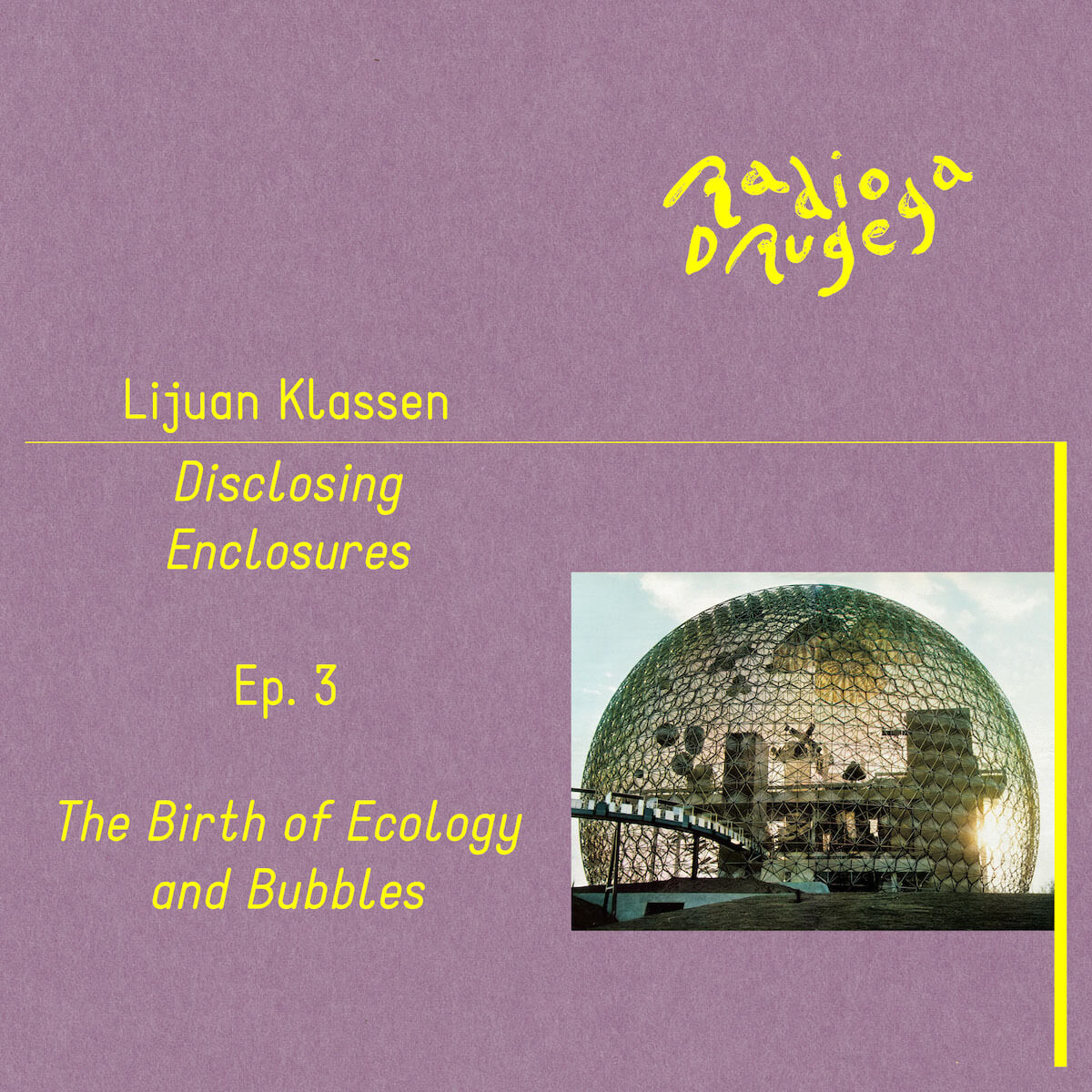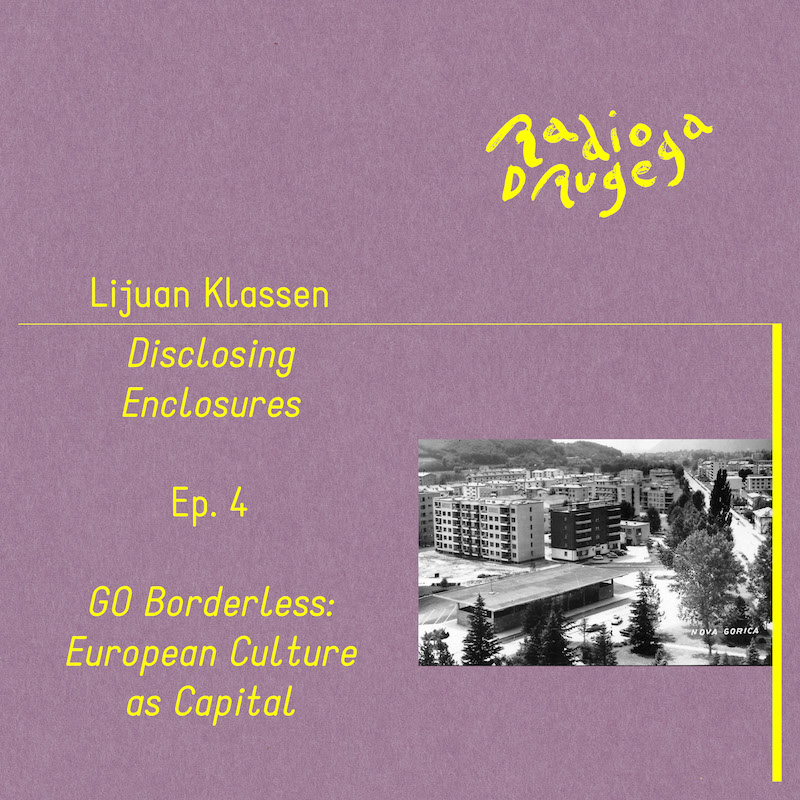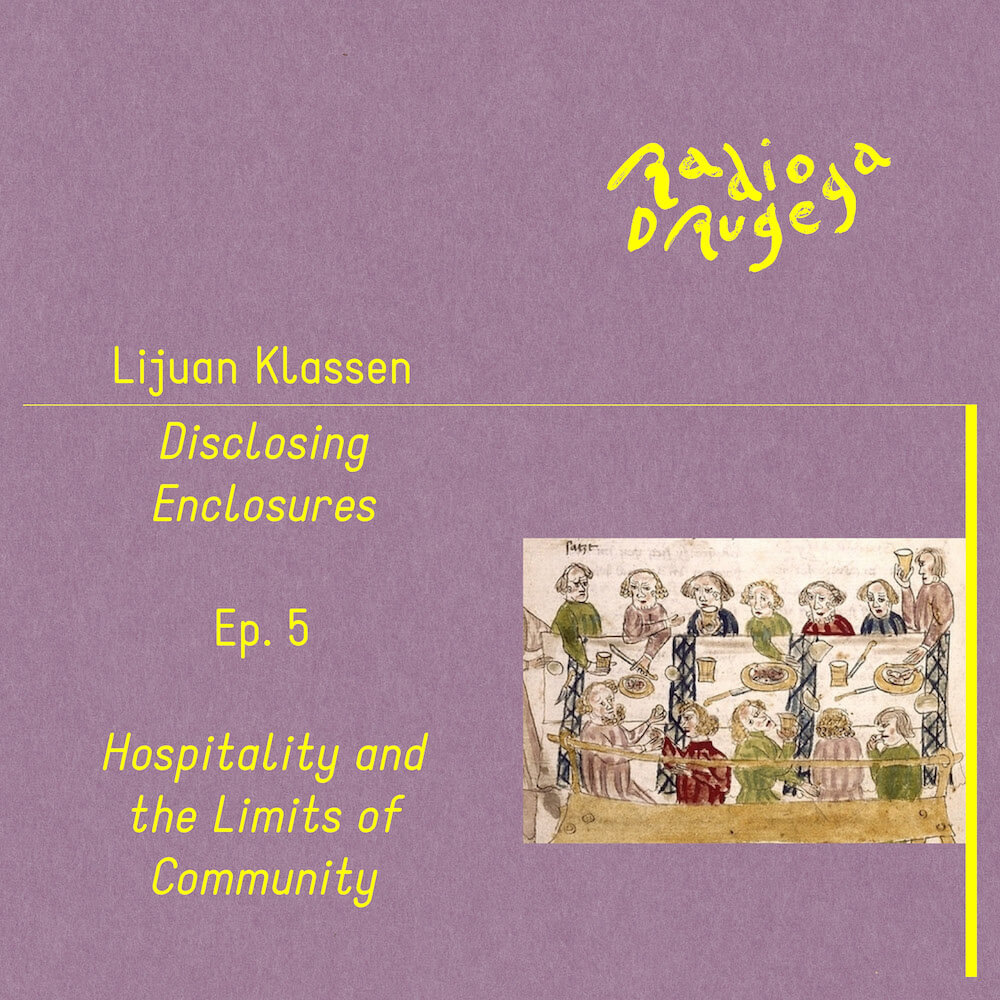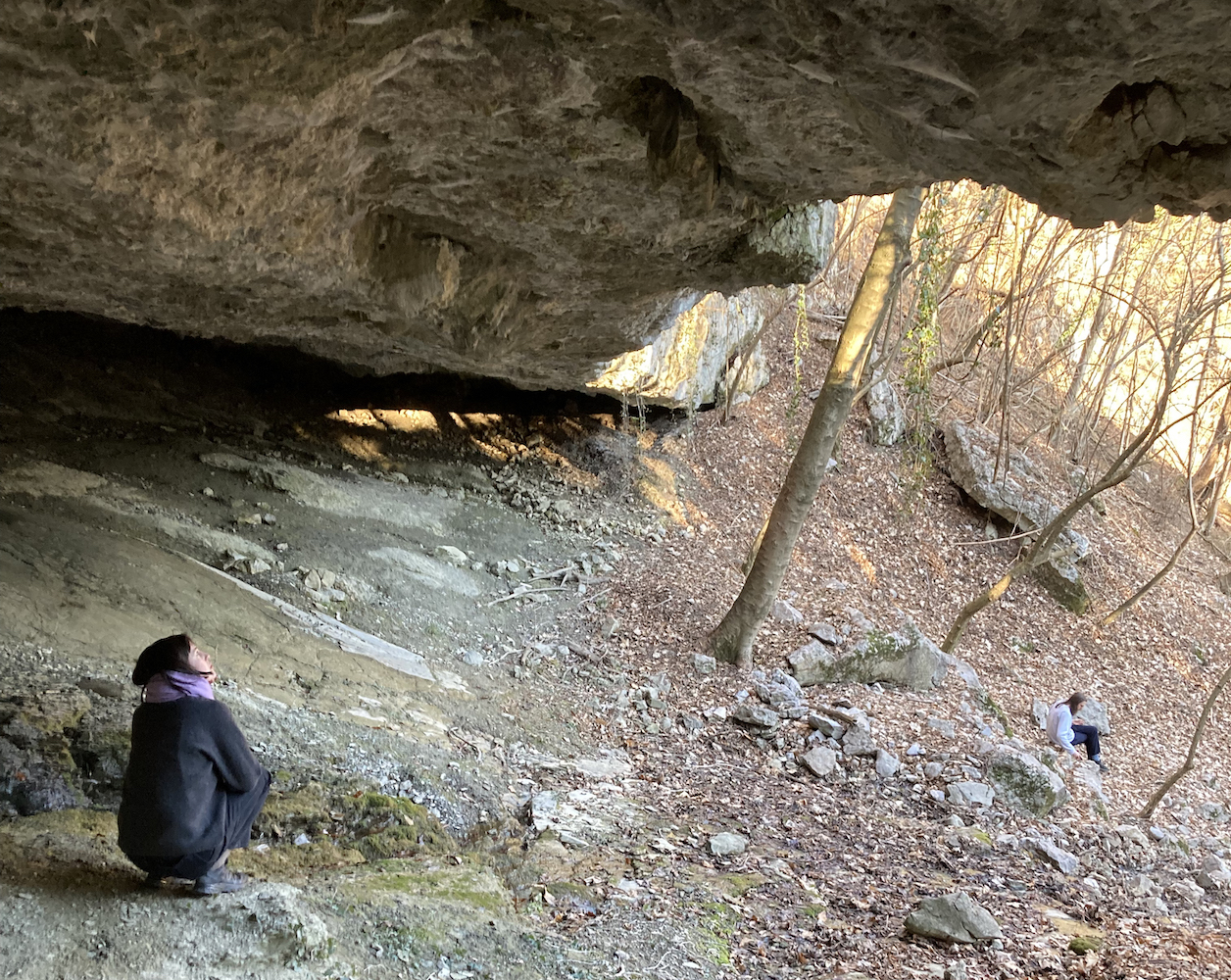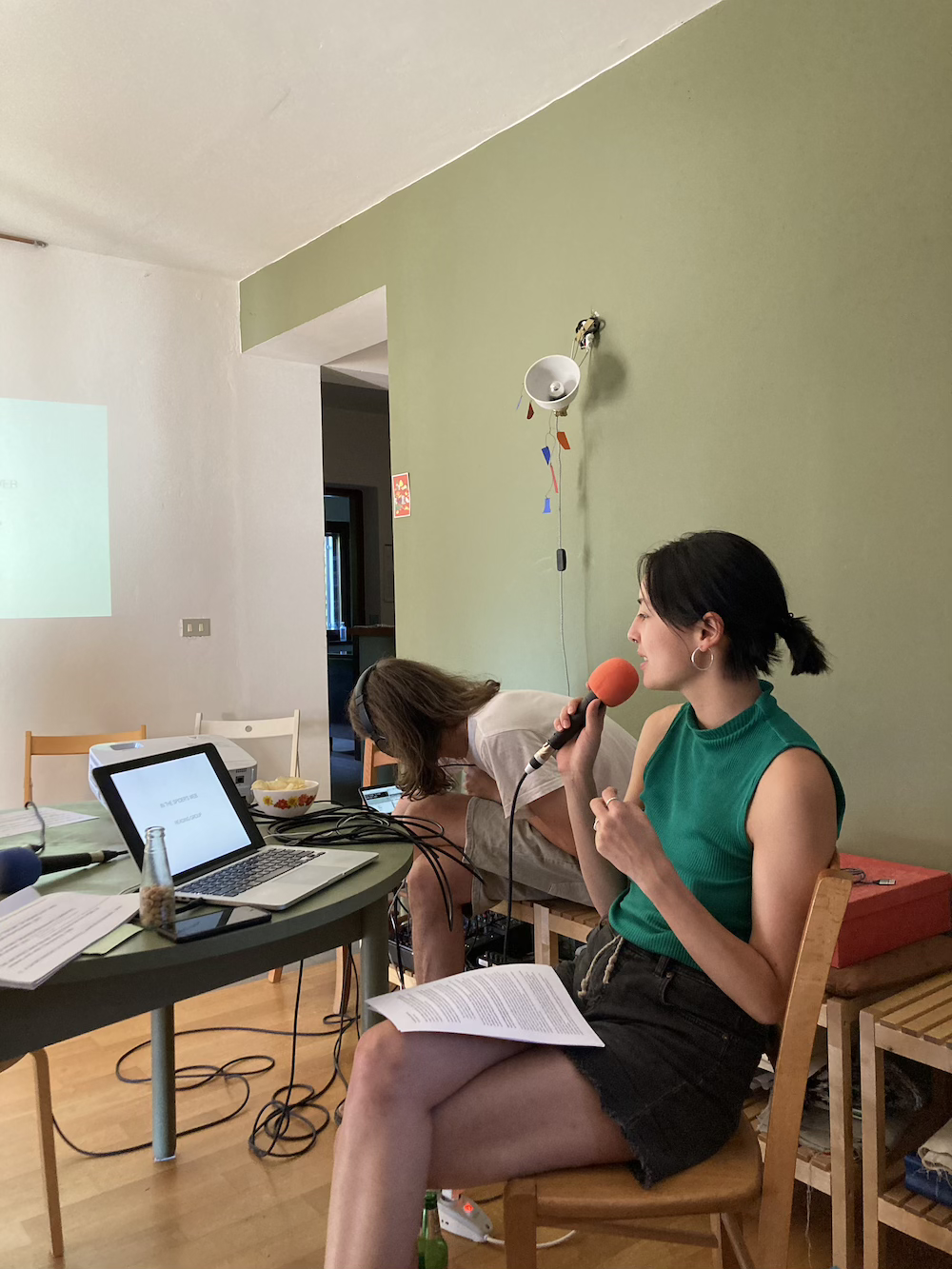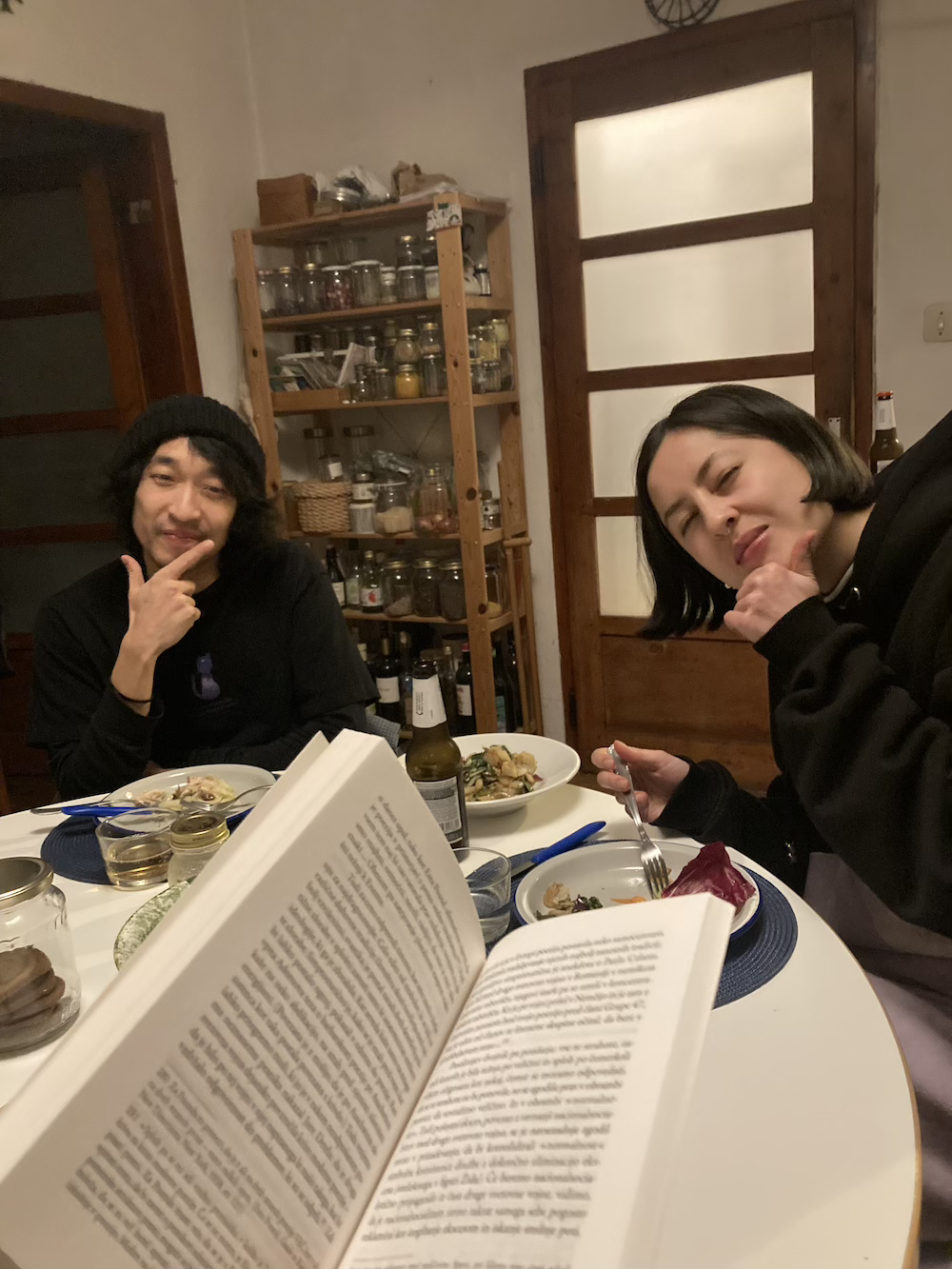Over five episodes, this show will explore the concept of enclosure. The enclosure movement historically refers to the gradual privatisation of common land by wealthy landowners, literally by drawing a fence or hedge around an open field. Each episode takes a different angle to unpack the social, material and philosophical meaning of enclosure practices on varying scales, from medieval England to present-day Topolò.
We begin with introductory remarks on the history of dispossession and revolts in medieval Europe, followed by the story of land privatisation in Topolò. In the second episode, we look at the body as a territory in light of women's enclosure in the private sphere of the household and the separation of social production from reproductive labour. The third episode is dedicated to the relations between enclosures and ecology, with another special guest, Antonio Frederico Lasalvia, who tells us about bubbles and spheres. For the fourth episode, we visit the twin cities Nova Gorica and Gorizia, reflecting on life at the border, material, imagined, abolished or new. The show concludes with a conversation on Of Hospitality by Jacques Derrida with Donovan Stewart, departing from the question at the core of centuries of struggle over commons and enclosures, which is how to live well and just together within the planetary boundaries.”
The Other Radio/Radio Drugega program is financed by Javni zavod GO! 2025 - Evropska prestolnica kulture, Nova Gorica.
〰️
Oddaja bo v petih epizodah raziskala koncept ograjenega prostora. Gibanje ograjevanj se zgodovinsko nanaša na postopno privatizacijo skupne zemlje s strani bogatih lastnikov zemljišč, z dobesednim risanjem ograje ali žive meje okoli odprtega sveta. Vsaka epizoda nastopi iz drugačnega zornega kota, tako da razkrije družbeni, materialni in filozofski pomen ograjevalnih praks v različnih obsegih, od srednjeveške Anglije do današnjega Topolovega.
Začnemo z uvodnimi opombami o zgodovini razlastitev in uporov v srednjeveški Evropi, ki ji sledi zgodovina privatizacije zemlje v Topolovem. V drugi epizodi gledamo na telo kot teritorij v luči zaprtosti ženske v zasebno sfero gospodinjstva in ločevanja družbene proizvodnje od reproduktivnega dela. Tretja epizoda je posvečena razmerju med ograjenimi prostori in ekologijo, s posebnim gostom, Antôniom Fredericom Lasalvio, ki nam pripoveduje o mehurčkih in sferah. V četrti epizodi obiščemo pobrateni Novo Gorico in Gorico ter razmišljamo o življenju ob meji_ materialnem, namišljenem, ukinjenem ali novem. Oddaja se zaključi s pogovorom o delu O gostoljubju Jacquesa Derridaja z Donovanom Stewartom, ki izvira iz vprašanja, ki je jedro stoletnega boja za skupne in ograjene prostore, to je, kako dobro in pravično skupno živeti znotraj planetarnih meja.
Program Radia Drugega/The Other Radio financira javni zavod GO! 2025 - Evropska prestolnica kulture, Nova Gorica.
〰️
Ep. 1 Historiographies of Enclosures
Historically enclosures describe the struggles between the processual privatization of common land by law and by force and anti-enclosure resistance and commoning efforts in medieval Europe. For Karl Marx, the enclosure of common land constituted the “primitive accumulation” of capital that enabled the transition from Feudalism to Capitalism. However, a classical Marxist analysis of the processes at this time often omits the crucial role played by the exclusion of women from the labour market and their enclosure in the private family home, as well as the violent expulsion of Indigenous people and the enclosure of their land, and the labour by enslaved people in the European colonies. Enclosures were never innocent but engendered a relationship to the natural environment that viewed land as private property. In the case of settler colonialism, as well, the right to declare land as one's property is grounded on and was justified by a racist rationale. This episode asks how enclosures were differently understood and justified. What were the immediate and distant, material and cultural repercussions of enclosures? And to bring it to a local context, how did enclosures affect life in Topolò?
Ep. 2 Body as Territory
In this episode, we will consider enclosure through the lens of the historical inclusion of women in the private sphere of the family home, and the split of work from reproductive labour. In the 1970s, Italian autonomist feminists, together with feminists from the UK and France, founded the Wages for Housework Campaign. They demanded the recognition and fair compensation of domestic labour as work, thereby challenging the naturalised role of women as housemakers. Just two generations ago, it was still the expected of women to become ‘housewives’, ‘mothers’, ‘cleaners’, and ‘cooks’, carrying out the so-called ‘labours of love’. While women’s rights and roles have significantly expanded over the past decades, today domestic labour and care work are still maroritively being carried out by women or outsourced to immigrant and underpaid workers. A dynamic, which became very clear at the height of the pandemic. Does the Wages for Housework campaign still resonate with contemporary struggles? How do we define reproductive labour today? How did the cultural and economic changes in society shift the lines of conflict?
*Featuring Vida Rucli and Franca Lucchita
Bibliography:
- "May Day (I° Maggio),” Il Canzoniere Femminista, 1977
- "All Work No Pay,” Made by the Wages for Housework Campaign with the BBC TV's Open Door series, 1976
- Dalla Costa, Mariarosa, and Selma James. The Power of Women and the Subversion of the Community. 1975
- Dalla Costa, Mariarosa. “A General Strike”, Originally published in All Work and No Pay: Women, Housework and the Wages Due. Falling Wall Press. 1975
- zoeunlimited. “‘I Dream of Becoming a Hot Trad Wife.’” YouTube, 14 Mar. 2024
- BBC Stories. “‘Submitting to My Husband Like It’s 1959’: Why I Became a TradWife¦ BBC Stories.” YouTube, 17 Jan. 2020
- Hu, Zoe. “The Agoraphobic Fantasy of Tradlife - Dissent Magazine.” Dissent Magazine, 22 Dec. 2023
- Federici, Silvia. Wages Against Housework. 1975
- Federici, Silvia. Caliban and the Witch: Women, the Body and Primitive Accumulation. Penguin UK, 2021
- Nineteenth century videos. Back to life. “[4k, 60fps, Color] (1949) Grandma’s Kitchen Organization Hacks.” YouTube, 3 Apr. 2022
- Everything has its first time. “Martha Rosler - Semiotics of the Kitchen 1975.” YouTube, 18 Oct. 2017
- Socialize Care Work! - Rosa-Luxemburg-Stiftung. 29 Apr. 2022
- “Avete Mai Guardato.” Il Canzoniere Femminista, 1977
Ep. 3 The Birth of Ecology and Bubbles
So far, we have looked at the history of enclosures from a social, economic and gendered perspective, but what if we tried to de-centre humans for a moment and consider the effects that enclosures have on more than human worlds? For instance, by considering the way that plantation economies in formerly colonised territories have changed and affected the local species’ life or the environmental repercussions of the contemporary enclosure of water, air and energy. Furthermore, thinking from a multi-species perspective, we could even say that enclosure understood in the literal sense as encapsulation, envelopment or boundary is a fundamental aspect of organismic life, preceding not only feudalism and the first human settlements but human life as such. In an ecological sense, enclosures could be described in terms of an ongoing negotiation between an inside and outside, an individual and its milieu, an organism and its ‘Umwelt’. Framing enclosure and its effects in a broader sense, beyond human history, allows us to focus on different scales of (in)organic enclosures. When are enclosures necessary? How do different structures of enclosure constitute spatial regimes?
*Featuring Antônio Frederico Lasalvia
Ep. 4 GO Borderless? European Culture as Capital
With the example of the European Capital of Culture 2025: Nova Gorica in Slovenia and its bordering twin city Gorica in Italy, we move into the territory of a 21st-century enclosure - culture as capital. The slogan of the European Capital of Culture 2025, "Go! Borderless", embraces a core value of European cultural identity. A value that stands in stark contrast to the fortification of Europe's borders, the illegal return of migrants and the cooperation with authoritarian regimes to prevent migrants from seeking asylum in the first place. The fear of external intruders overshadows the fact that the inside/outside of Europe is a historically shifting border. Rather than affirming or transcending borders, we should ask how borders shape cultural identity, history and memory, not only by 'separating' but by constituting the conditions out of which relationships emerge, between stranger and native, host and guest, enemy and friend, smuggler and traveller. How did the border between Nova Gorica and Gorizia materialise, architecturally, affectively, socially and culturally; have these borders really disappeared and what are the fault lines between the cities, people and politics today? What do we have in common? Who is part of the European "we" without borders and who is the other of a European cultural identity?
This episode was made with the generous help of Aljaž Škrlep and features Žiga Ipavec and Matej Okroglič.
References:
- Igor Levit. (18.12.2020) performing "Ode to Joy" (from Beethoven's Symphony No. 9, Op.125), https://www.youtube.com/watch?v=t1f_cDQDEYY
- Short, Elizabeth. “Nova Gorica.” TUDA, 19 Sept. 2020, tuda.xyz/nova-gorica.
- “About GO! 2025.” https://www.go2025.eu, www.go2025.eu/en/about.
- Derrida, Jacques. The Other Heading: Reflections on Today’s Europe. Indiana UP, 1992.
- Gržinić, Marina. “Biopolitics and Necropolitics in relation to the Lacanian four discourses.” Paper presented at the Symposium Art and Research: Shared Methodologies. Politics and Translation, Barcelona, Spain, 6–7 September 2012.
- Laibach. (2014), "Eurovision", Spectre, 2014
Ep. 5 Hospitality And The Limits Of Community
In this final episode, I want to ask a question common to all these different stories of enclosures: how can we live well together? How can we live well together on a planet where the habitable space is rapidly shrinking and fascist populist leaders are successfully instrumentalising the feelings of insecurity and a lost future to their advantage? 2023 was the hottest year on record. Countries in the north are experiencing more extreme weather, heavy rainfall and flooding, while at the same time countries in the south, such as Greece and India, are experiencing record heat waves with temperatures reaching up to 51 degrees Celsius, a temperature at which human cells die off, if the body is unable to cool down. In addition to the growing number of heat-related deaths, heatwaves also pose a risk to critical infrastructure due to crop failures or overloaded power grids. In the context of planetary enclosures, is it not just the oppressed and marginalised groups in human societies whose health and well-being are at stake, but the very conditions of Earth's habitability? Through the lens of hospitality, how can we live well together with others - with the possibility of an other, a stranger intruding - with the possibility of receiving the other well?
